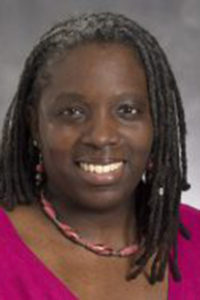
Medicine does not just heal bodies. Medicine also can help heal the cultural divides in our society, if clinicians are willing to own their part in the perpetuation of racism, says Nneka O. Sederstrom, PhD, MPH, MA, FCCP.
“If people don’t stand up and say, ‘Yes, we play a part in this and we want to do better,’ then there’s nothing that’s going to change,” she said. “The biggest need is for an ownership of how medicine has contributed to racial inequities and outcomes.”
Dr. Sederstrom, director of the clinical ethics department at Children’s Minnesota, will chair Being Me: Understanding ‘Otherness’ and Issues of Diversity at 3:00 pm CT, Sunday, October 18, during CHEST 2020. It is a follow-up to a standing-room-only session at last year’s meeting, where the panelists discussed what it meant to be part of the Black, brown, or gender-different community for the Transition and Trainee Committee. When they opened up the floor for questions, they expected to hear requests for advice on how the trainees could deal with various scenarios they might encounter on their own. Instead, the audience wanted to know how they could help their colleagues support them when they are faced with racism, sexism, religious discrimination, or cultural insensitivity.
“If people don’t stand up and say, ‘Yes, we play a part in this and we want to do better,’ then there’s nothing that’s going to change. The biggest need is for an ownership of how medicine has contributed to racial inequities and outcomes.”
In this year’s session, the panelists will focus on how to understand what “otherness” is and the individual’s role in addressing inequities and embracing diversity.
“We want to help our colleagues understand truly what it means to be a person of the Black and brown community in medicine, and develop awareness and build empathy so that we can build allies to help support us in the day-to-day microaggressions that we feel, with some of the day-to-day overt incidents of racism and all the other-isms that we deal with,” Dr. Sederstrom said.
She sees having these sometimes uncomfortable conversations as a positive step forward from a mentality of tiptoeing around the issue or thinking of diversity and inclusion as someone else’s business to manage.
“Now we’re being honest and open and wanting to make people get comfortable with being uncomfortable,” she said, “so we can move through it to a world that’s a little bit more fair and more equitable, and actually addresses outcomes in a manner that medicine’s supposed to be addressing outcomes.”
Another session, Prejudice and Discrimination in Health Care, at 3:45 pm CT, Tuesday, October 20, will focus on the patient side of health equity, exploring the difference between being implicitly or explicitly biased toward individuals based on their membership in social groups vs someone having a prejudice. Dr. Sederstrom will cochair the session with Muhammad Adrish, MD, FCCP, FCCM, associate program director for pulmonary fellowship at BronxCare Health System.
“We sometimes act as if there is only one dominant culture and everyone else needs to amend to that culture,” she said. “That sets up barriers, and it sets up inability to truly understand what people need and give them access to the things that are necessary to improve their health care.”
She calls on clinicians to recognize the diversity of views, experiences, religious beliefs, and ethnic groups that make up our society. “If we don’t address the beauty in that diversity, we’re doing a disservice to our colleagues and to our patients,” Dr. Sederstrom said.
A panel discussion on cultural sensitivity in palliative care at will begin at 8:45 am CT, Monday, October, 19.
Visit chestmeeting.chestnet.org for up-to-date session and meeting information.
Are you registered for CHEST 2020?
Join your colleagues for four days of interactive, top-tier education on Saturday, October 18, to Wednesday, October 21, with dozens of live sessions and 50 credit hours of CME—all from the safety of your home. All CHEST Annual Meeting registrants will have access to the virtual platform until January 18, 2021.





